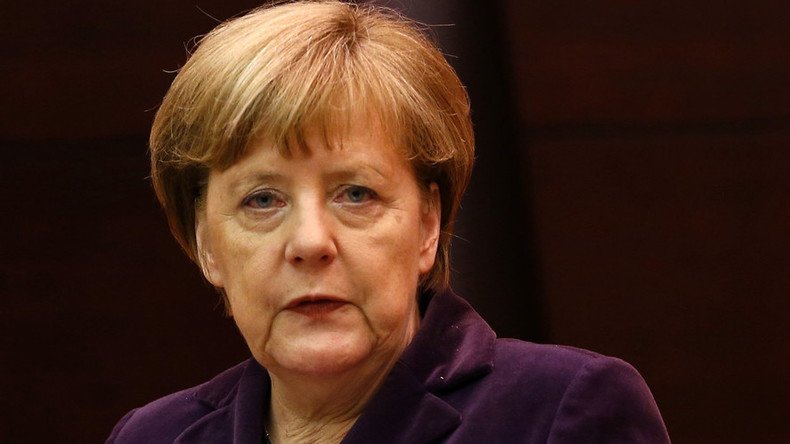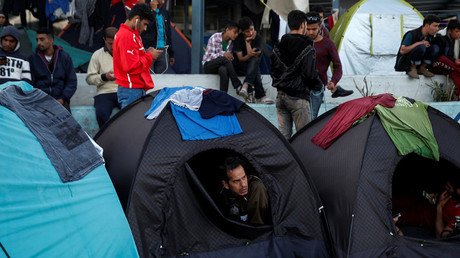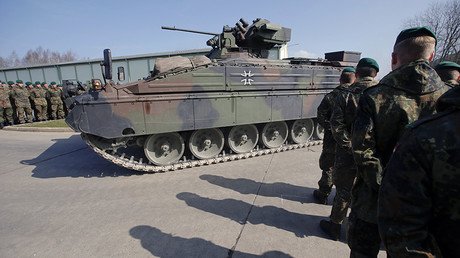‘Defend our borders’: Merkel urges Europe to tighten border security citing threat of nationalism

Angela Merkel says the EU risks sliding into “nationalism” if it fails to secure its borders against the wave of refugees. Merkel’s call coincides with reports that Berlin is pushing to establish a German-led EU army.
At a joint press-conference with Italian PM Matteo Renzi on Thursday, Germany’s leader called on her EU counterparts to step up joint efforts to stem the uncontrolled migration that has continued to plague Europe.
“Either we defend our external borders and we do it together or we risk falling back into nationalism,” she said, emphasizing that the task of protecting common European frontiers “from the Mediterranean to the North Pole” should be shared by all European countries for the sake of Europe’s future.
READ MORE: EU Commission backs visa-free travel deal with Turkey
More than one million immigrants, predominantly from the Middle East and North Africa, crossed into the continent last year, challenging the border-free Schengen zone and forcing several countries to introduce restrictions.
“This is not a challenge for Greece, Germany, or Italy, but these are challenges that have to do with the future of Europe,” Merkel stressed.
Citing possible measures to resolve the crisis, Merkel backed Italy’s proposal that would see the EU offer direct financial aid to African countries to help them contain mass migration and fight human trafficking.
Islam does not belong in Germany, 60% agree with AfD https://t.co/KyBsDt5pa5pic.twitter.com/mCxdxuax54
— RT (@RT_com) 5 мая 2016 г.
In her remarks, Merkel referred to the “migration compact,” a non-official memorandum drawn up by the Italian government and sent to EU institutions last month. Among other foreseen measures, the document maps out a partnership agreement to be signed with the nations of the migrants’ origin, while presupposing that European bonds would be issued to fund the proposal. “If we concentrate on the European budget, we will find (the money),” Merkel said, estimating the sum required to implement the plan at €1 billion ($1.14 billion).
Although Merkel opposed the idea of the debt pooling, she endorsed a pan-European approach to solving the migrant issue.
“Even though there are different views on the financing, we have the same opinion on the overall effort,” she said.
The talks in Rome took place only a few days after a defense white paper was leaked suggesting that Berlin has renewed its push to create common European armed forces, with Germany taking a leading role.
“German security policy has relevance – also for beyond our country. Germany is willing to join early, decisively and substantially as a driving force in international debates... to take responsibility and assume leadership,” reads the paper, obtained by the Financial Times.
The draft argues that Europe’s current defense forces can’t stand up to international competition and their fragmented nature prevents the EU from successfully launching joint operations. The authors urge EU-members to boost the block’s military capabilities, which should be “jointly planned, developed, managed, procured and deployed” in order to “raise the interoperability of Europe’s defense forces and to further improve Europe’s capacity to act.”
Germany has long sought to expand the EU’s military powers – a move that some view as an attempt to create a pan-European military structure not fully dependent on NATO.
German Finance Minister Wolfgang Schäuble unveiled a proposal in December to pool the national armies of the EU’s 28 member-states into a common “European Army” so that the block could take a more active role in combatting conflicts in Middle Eastern and African countries.
The white paper was initially to be made public before the British referendum on EU membership scheduled to be held on June 23, but its publication was reportedly delayed out of concern that it could cater to the “Leave” camp, since the establishment of a “European Army” would necessitate giving up more authority to EU institutions.
The document drew a sharp reaction from some pro-Brexit British politicians after being revealed by the Financial Times.
READ MORE: German plans for EU army ‘dangerous fantasy that diverts money
Former Tory Defense Secretary and a Brexit campaigner Liam Fox branded the plan “a dangerous fantasy that diverts money away from NATO.”
“It is typical of the EU to make these sovereignty threatening decisions behind closed doors, and then to gradually implement them before finally presenting the desired outcome as a fait accomplice to the people of Europe,”said UKIP Defense Spokesman Mike Hookem, while lambasting the proposal.
However, the controversial proposal received support from former UK prime minister and Brexit “Stay” advocate Tony Blair, who said he hoped the pan-European armed forces would not substitute NATO, but “would have the independent ability to take military action at times when Europe’s security interests are threatened when the US may decide not to be involved.”














